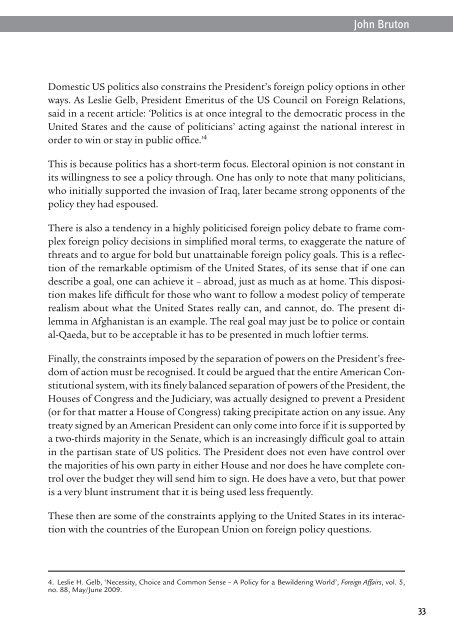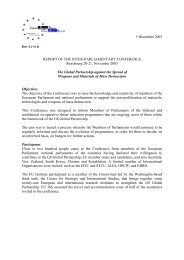The Obama Moment. European and American Perspectives
The Obama Moment. European and American Perspectives
The Obama Moment. European and American Perspectives
Create successful ePaper yourself
Turn your PDF publications into a flip-book with our unique Google optimized e-Paper software.
John Bruton<br />
Domestic US politics also constrains the President’s foreign policy options in other<br />
ways. As Leslie Gelb, President Emeritus of the US Council on Foreign Relations,<br />
said in a recent article: ‘Politics is at once integral to the democratic process in the<br />
United States <strong>and</strong> the cause of politicians’ acting against the national interest in<br />
order to win or stay in public office.’ 4<br />
This is because politics has a short-term focus. Electoral opinion is not constant in<br />
its willingness to see a policy through. One has only to note that many politicians,<br />
who initially supported the invasion of Iraq, later became strong opponents of the<br />
policy they had espoused.<br />
<strong>The</strong>re is also a tendency in a highly politicised foreign policy debate to frame complex<br />
foreign policy decisions in simplified moral terms, to exaggerate the nature of<br />
threats <strong>and</strong> to argue for bold but unattainable foreign policy goals. This is a reflection<br />
of the remarkable optimism of the United States, of its sense that if one can<br />
describe a goal, one can achieve it – abroad, just as much as at home. This disposition<br />
makes life difficult for those who want to follow a modest policy of temperate<br />
realism about what the United States really can, <strong>and</strong> cannot, do. <strong>The</strong> present dilemma<br />
in Afghanistan is an example. <strong>The</strong> real goal may just be to police or contain<br />
al-Qaeda, but to be acceptable it has to be presented in much loftier terms.<br />
Finally, the constraints imposed by the separation of powers on the President’s freedom<br />
of action must be recognised. It could be argued that the entire <strong>American</strong> Constitutional<br />
system, with its finely balanced separation of powers of the President, the<br />
Houses of Congress <strong>and</strong> the Judiciary, was actually designed to prevent a President<br />
(or for that matter a House of Congress) taking precipitate action on any issue. Any<br />
treaty signed by an <strong>American</strong> President can only come into force if it is supported by<br />
a two-thirds majority in the Senate, which is an increasingly difficult goal to attain<br />
in the partisan state of US politics. <strong>The</strong> President does not even have control over<br />
the majorities of his own party in either House <strong>and</strong> nor does he have complete control<br />
over the budget they will send him to sign. He does have a veto, but that power<br />
is a very blunt instrument that it is being used less frequently.<br />
<strong>The</strong>se then are some of the constraints applying to the United States in its interaction<br />
with the countries of the <strong>European</strong> Union on foreign policy questions.<br />
4. Leslie H. Gelb, ‘Necessity, Choice <strong>and</strong> Common Sense – A Policy for a Bewildering World’, Foreign Affairs, vol. 5,<br />
no. 88, May/June 2009.<br />
33



